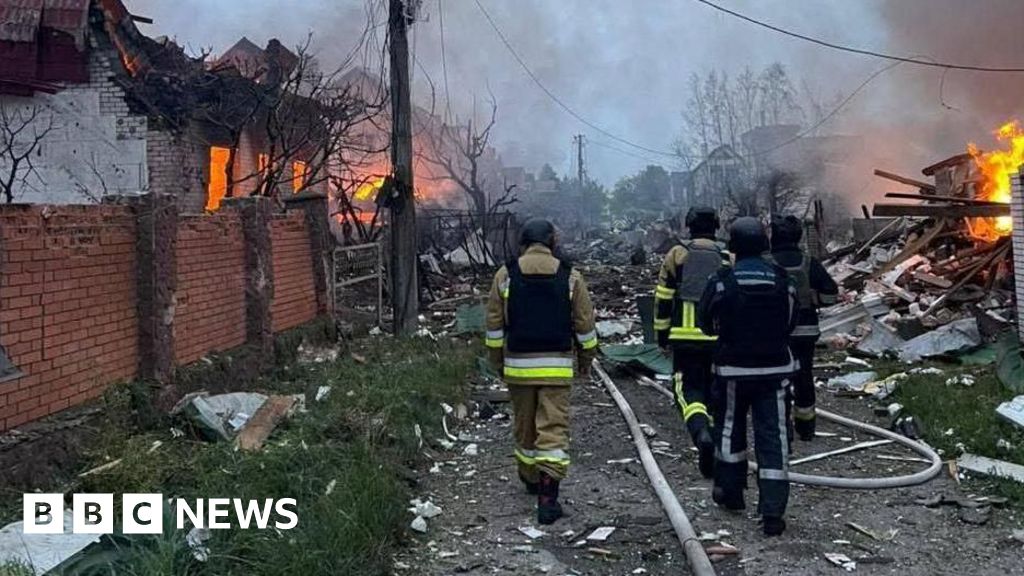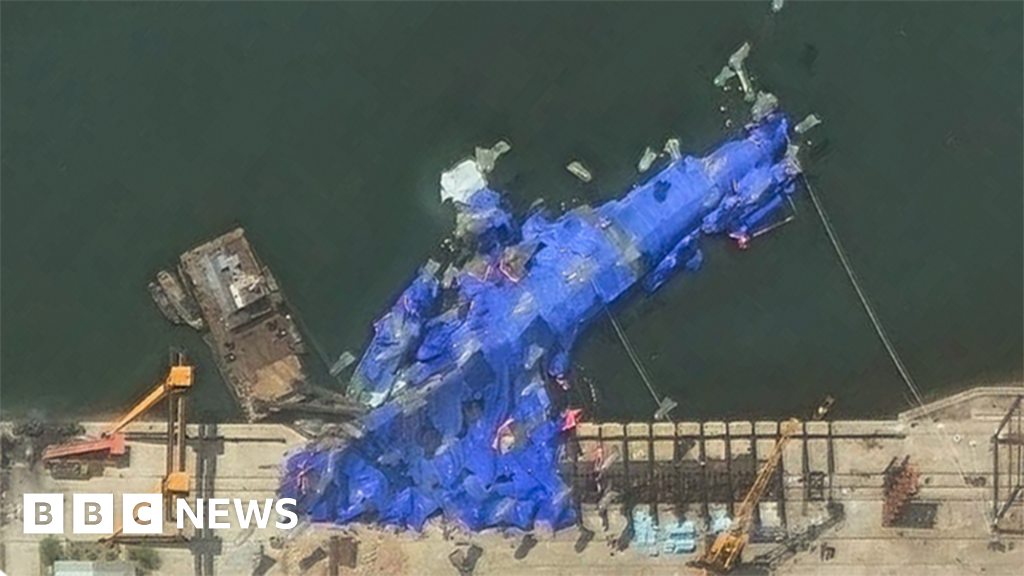ARTICLE AD BOX
It's the end of week one at the COP26 climate conference in Glasgow, and world leaders have already made some big commitments.
More than 40 countries have promised to phase out coal by 2050, and another 100 leaders have pledged to end and reverse deforestation by 2030.
The US and EU, meanwhile, announced that they would partner up to cut methane emissions.
BBC reporters across the globe - from Shanghai to Sao Paulo - explain how the summit and the climate pledges are going down in their countries.
Chinese social media has not been flooded with criticism of the West at COP26, writes Stephen McDonell in Beijing.
The response in China's state-controlled media to the climate summit has been fairly muted. It's not that ordinary people in China don't know that the conference is taking place, but the coverage of it has definitely been downplayed.
Perhaps Xi Jinping choosing not to attend the gathering was a key factor. To report on it might draw attention to the fact that, unlike other major nations, nobody represented China at leader level.
Also, China's media is of the Communist Party and for the Communist Party. Coverage of anything involving Mr Xi, who is the General Secretary of the Party, is tightly controlled. Media outlets here would not ignore such a meeting - to which Mr Xi sent a message in lieu of an appearance - unless they had been ordered to.
Of course the conference has, at various points, been referred to. Nationalist stirrers - like those featured in the Global Times - have criticised US President Joe Biden, particularly after he singled out his Chinese counterpart for not showing up.
But Chinese social media have not been flooded with criticism of the West at COP26 - it's all been fairly subdued.
Perhaps, for climate scientists wanting to build a sense of urgency and momentum out of this summit, ignoring what's happening there may be worse than attacking it.
It's all about domestic politics, writes Laura Trevelyan in New York
President Biden was determined to use COP26 to showcase American leadership on climate on the world stage - but, as MSNBC opinion columnist Hayes Brown noted, first of all, he had to apologise.
Since President Trump pulled the US out of the Paris climate accord, that "put us sort of behind the eight ball a little bit,' he acknowledged on the summit's first day.
The US has a see-saw approach to global climate agreements depending on which party has the presidency. So Americans know that whatever is agreed in Glasgow could be reversed by a Republican president in 2025.
Image source, Getty Images
Image caption,A tractor moves through a coal prep plant outside the city of Welch in rural West Virginia
The conservative-leaning Wall St Journal pointed out that President Biden tried to paint Russia and China as "isolated holdouts" to a global consensus on reducing emissions but efforts by the US and its allies failed to get Moscow and Beijing to budge.
At home it's the position of Democratic Senator Joe Manchin, a crucial vote when it comes to getting a $500bn climate plan through Congress, that's getting attention.
Mr Manchin is from a coal producing state, West Virginia, and when he said he had lingering concerns about the spending package, headlines declared: "Biden's climate pledge risks being undermined by holdout senator."
There is no sense of a climate emergency in Russia, writes Steve Rosenberg in Moscow.
A British newspaper headline this week - Queen's plea to save our 'fragile' planet.
Russia's most popular (pro-Kremlin) daily - Should we really be scared of global warming?
It concluded we shouldn't, claiming there are "positive consequences of global warming" (especially for Russia): lower heating bills, more accessible shipping routes.
There's no sense here of a climate emergency.
Not that the Kremlin denies there's a problem. It points out that the climate in Russia is warming 2.5 times faster than the world average.
It sent a big delegation to Glasgow. No president, though. Vladimir Putin appeared by video screen only.
Still, Russia promises to be carbon neutral by 2060. It signed the Glasgow declaration on forests and land use, pledging an end to deforestation by 2030.
But it wouldn't sign up to cutting methane emissions 30% by 2030. Russia is a fossil fuel superpower and wants a "smooth" (longer) transition to greener energy.
"Everybody wants Russia to do more to achieve carbon neutrality as soon as possible," Vasily Yablokov of Greenpeace Russia tells me.
"I'm happy Russia now accepts climate change is happening, but I see no high ambition from our country. It looks like the Russian government's from another planet."
India's 2070 net zero pledge has won Narendra Modi applause in a growing nation balancing economic and environmental needs, writes Rajini Vaidyanathan in Delhi.
Although India has been a big talking point among policy makers in the weeks leading up to the COP summit, COP hasn't been such a big topic for India's masses.
But on Monday, when Prime Minister Modi announced that the country would commit to net zero by 2070, many who weren't paying much attention to goings on in Glasgow finally took note.
AFP
COP hasn't been such a big topic of conversation with the masses in India
Mr Modi's address was broadcast on prime time here, and while some around the world are frustrated India is signing up to meet these goals two decades later than the global 2050 target, here the pledges were seen as pragmatic in a growing country which needs to balance both economic and environmental needs.
They were also viewed by many as a reminder that the PM won't succumb to pressure when the West has long reaped the benefits of growth while polluting. As Mr Modi reminded the summit, "India, which is 17% of the world population, is responsible for less than 5% of emissions" - a line that many here applauded.
The First Post news website called the 2070 pledge a "bold decision... without capitulating to the uncalled for bullying by the West". And climate experts here say India's four shorter-term goals - to scale up renewables and reduce carbon emissions by 2030 - are also significant.
Australia's part in the Cop26 summit is overshadowed by politics writes Shaimaa Khalil in Sydney.
Part of Scott Morrison's job at Cop26 was to explain to the world how he was going to deliver on net zero by 2050 without phasing out coal. But the prime minister's trip to Glasgow was overshadowed by a row with French President Emmanuel Macron - and not about the climate, about submarines.
On Sunday in Glasgow, Mr Macron accused Mr Morrison of lying to him about a $37bn deal with France which collapsed under controversial circumstances. Mr Morrison replied by saying his nation would not accept "sledging" or "slurs".
And so this past week, rather than discussing the pressing climate debate and what Australia had achieved at COP26, most of the commentary here has been about Mr Morrison's character and whether the row will affect his standing domestically.
"Slipperiness is Scott Morrison's defining characteristic," wrote journalist Hugh Riminton in the Guardian. "And it was never more on show than this week as he sold "the Australian Way" on climate to a sceptical crowd in Glasgow, while openly being branded a liar by France."
Australia did make a few climate headlines in Glasgow. Along with China, Russia, India and Iran, it snubbed the international pledge to reduce methane emissions by 30% by 2030, and refused to sign up to phasing out coal-fired power and stop investing in new coal plants at home and abroad.
The verdict from Australia's ABC News? A "terribly messy week" for the prime minister.
The climate conference in Scotland feels a long way from the reality of most Brazilians, writes Katy Watson in São Paulo.
Much is made of Brazil's contribution to climate change internationally because of its immense rainforest. But with all that President Jair Bolsonaro says and does - and the fact he didn't even attend COP26 - it feels a bit different over here.
Yes, the Amazon is in the same country, but it's a long way from big cities like São Paulo and Rio, and probably feels just as distant as a climate conference in Scotland.
It's not that Brazilians don't care.
"People do want to participate and they have lots to contribute," says Silvia Cervellini, co-founder of Delibera, a Brazilian organisation helping people get involved in politics.
But since the pandemic, there's been a rise in poverty and the political and economic crisis is casting a shadow over Brazil. People have more immediate concerns. "What we need to do is enable people to make the connection with daily life," Ms Cervellini says.
And that's something that dressmaker Izildete Maria de Sousa Botelho agrees with. The 67-year-old from Minas Gerais state was selected to be part of the Global Citizen Assembly for COP.
"If we are cutting down trees, we need to rethink what we eat," she says. "We outsource the responsibility to authorities and politicians and forget that it's individual actions, it's the lack of ecological awareness that we need to work on that is causing all of this."
Many in Iran believe that it is unfair to expect the country to make any climate commitments while the sanctions remain, writes BBC Persian Service correspondent Siavash Ardalan.
Iran is among the top 10 emitters of greenhouse gases and suffers extensively from the effects of global warming. The country has seen one its worst droughts in decades this year, resulting in severe water shortages and electricity blackouts.
US sanctions and unsustainable domestic policies have only exacerbated such problems.
One member of Iran's delegation to COP26 has said that if the sanctions were lifted, "there would be no obstacle for us to reduce our emissions".
However, conservatives affiliated to President Ebrahim Raisi's government have put out statements that range from climate change denial to assertions COP26 is seeking to deprive Iran of its oil and gas.
Although the summit has been largely ignored by Iranian media, such critical views have made their way to some pro-government conservative outlets.
A few reform-minded newspapers have meanwhile echoed the dire warnings from UN officials and climate scientists while avoiding any critique of the government's low-key approach to COP26.
Public opinion is divided. Many believe that it is unfair to expect any commitments from Iran while the sanctions remain in place. Others argue that climate change has only served to downplay government incompetence.
COP26 is not front page news in Nigeria, writes Nduka Orjinmo in Abuja.
Nigeria, Africa's largest oil exporter, has promised zero emissions by 2060.
The big media houses have sent reporters to Glasgow but it is not front page news in Nigeria.
On Wednesday, President Muhammadu Buhari said no-one in Nigeria needed "persuading of the need for urgent action on the environment," pointing to desertification, floods and erosion in the country as "enough evidence".
AFP
Activists have long sounded the alarm against oil drilling, but there is little sign of action
But he wants access to climate finance - some of the $100bn annually available to developing economies - and foreign investment in Nigeria's gas sector to help the country wean itself off its major revenue earner, oil.
The president struck the right notes for those in Glasgow but back home people, in homes powered by gasoline generators imported from China, live in a different reality.
No-one here has experienced a stable power supply in their lifetime and if it takes burning coal to achieve that, few will reject it for the sake of the climate.
Climate activists, especially in the oil-producing Niger Delta region, have long sounded the alarm about the impact of oil drilling and gas flaring but there is little sign of any action from the government and the international oil firms.
Even as Saudi Arabia seeks to achieve net zero by 2060, the country is boosting its oil production, writes Middle East Business Correspondent Sameer Hashmi.
For a long time, the world's largest oil exporter, Saudi Arabia, had resisted calls from Western countries to set a definite target to reduce carbon emissions.
Then last month, the crown prince, Mohammed bin Salman, announced that the country had set a goal of reaching net zero carbon emissions by 2060.
But, even as the Saudis seek to achieve that objective, they are boosting their oil production capacity to cater for global demand.
The country's top officials have repeatedly said tackling climate change is necessary, but that it cannot be done by "demonising" hydrocarbons. The energy minister believes the world needs both fossil fuels as well as renewables.
Most officials I spoke to there supported the crown prince's goal and his efforts to promote economic diversification by investing in new industries. The response by environmental activists though was more muted.

 3 years ago
119
3 years ago
119








 English (US) ·
English (US) ·